| Pages:
1
2
3
4 |
LanthanumK
Hazard to Others
  
Posts: 298
Registered: 20-5-2011
Location: New Jersey
Member Is Offline
Mood: No Mood
|
|
Use scratch tests with various materials (glass, knife, quartz, etc.) to determine Mohs' hardness. Tungsten has 7.5 hardness, platinum 4, and rhenium
7. If it can be scratched by a knife with difficulty, it is probably platinum.
hibernating...
|
|
|
phlogiston
International Hazard
    
Posts: 1379
Registered: 26-4-2008
Location: Neon Thorium Erbium Lanthanum Neodymium Sulphur
Member Is Offline
Mood: pyrophoric
|
|
rhenium dissolves in nitric acid, tungsten and platinum do not.
tungsten dissolves in warm, 30% hydrogen peroxide to give a yellow solution, platinum does not.
If the rod's diameter is uniform over its length, the volume measurement should be sufficiently accurate, and probably more so than typically achieved
by immersion.
| Quote: | | None directly. It was not a rant, merely a little piece of satire based upon the actual likelihood of it actually being true, which is vanishingly
small. Have you ever seen a piece of machined pure tungsten? What use would it be? |
Unlikely events happen. It is not as if we hear this story on a regular basis.
Although you may not be able to think of any, these things exist and are used. Keep in mind he worked in a pretty unusual place.
Machined tungsten items are easy to find online:
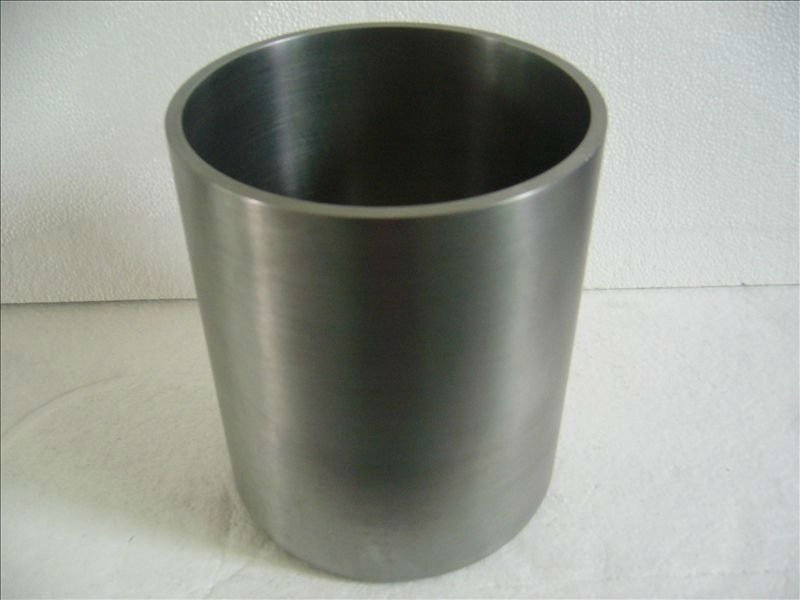
| Quote: | | People do not have about $9000 worth of shiny Pt rod or large billets of W in their basements. |
Apparantly, some people do. You should check out some of the wonderful items some element collectors have.
-----
"If a rocket goes up, who cares where it comes down, that's not my concern said Wernher von Braun" - Tom Lehrer |
|
|
Fleaker
International Hazard
    
Posts: 1252
Registered: 19-6-2005
Member Is Offline
Mood: nucleophilic
|
|
If you want, you can send it to me. I will use XRF analysis on it and tell you what it is. It's either platinum, rhenium, or iridium (it isn't osmium,
I can tell that right away--plus that's so difficult to cast or sinter).
Looks like an iridium rod to me.
| Quote: |
People do not have about $9000 worth of shiny Pt rod or large billets of W in their basements. |
I know people who have way more expensive quantities of PGMs or other elements in their collection. I have a good friend of mine is a metallurgist who
has quite the collection of 5 and 10 kg sputtering targets out of Ta, Hf, Re, Zr, Nb, and W.
Attached is a piece of 9995 platinum so you can see its cast.
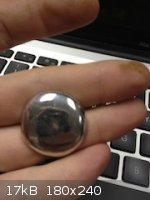
[Edited on 24-6-2012 by Fleaker]
Neither flask nor beaker.
"Kid, you don't even know just what you don't know. "
--The Dark Lord Sauron
|
|
|
unionised
International Hazard
    
Posts: 5129
Registered: 1-11-2003
Location: UK
Member Is Offline
Mood: No Mood
|
|
Quote: Originally posted by DerAlte  | unionised wrote: Any evidence for that rant?
None directly. It was not a rant, merely a little piece of satire based upon the actual likelihood of it actually being true, which is vanishingly
small. Have you ever seen a piece of machined pure tungsten? What use would it be?
Der Alte |
Yes, I have.
It was the electrode from a high power flash lamp.
Do you realise that your ignorance doesn't stop other people finding a use for it?
Incidentally, I also have a tin with 5Kg of tungsten sponge in it. It was chucked out as scrap so I git it for free. Not as valuable as a single rod,
but quite a nice find.
Also, I rather suspect that they start with lengths of rod to make these.
http://www.google.co.uk/search?q=tungsten+darts&hl=en&am...
[Edited on 24-6-12 by unionised]
|
|
|
cyanureeves
National Hazard
   
Posts: 744
Registered: 29-8-2010
Location: Mars
Member Is Offline
Mood: No Mood
|
|
tungsten carbide is not the same as tungsten is it? ebay mostly has tungsten carbide stuff like rings and drill bits but i would like to own tunsten
or separate it from the carbide if possible.
|
|
|
Endimion17
International Hazard
    
Posts: 1468
Registered: 17-7-2011
Location: shores of a solar sea
Member Is Offline
Mood: speeding through time at the rate of 1 second per second
|
|
The hardness test is a good starting point. Platinum crucibles are pretty easy to scratch with stainless steel.
|
|
|
blogfast25
International Hazard
    
Posts: 10562
Registered: 3-2-2008
Location: Neverland
Member Is Offline
Mood: No Mood
|
|
At the end of the day really only XRF will lay this to rest easily and conclusively.
|
|
|
unionised
International Hazard
    
Posts: 5129
Registered: 1-11-2003
Location: UK
Member Is Offline
Mood: No Mood
|
|
For a given definition of "easily" - specifically one that includes having access to an XRF rig.
|
|
|
blogfast25
International Hazard
    
Posts: 10562
Registered: 3-2-2008
Location: Neverland
Member Is Offline
Mood: No Mood
|
|
Quite a few jewelers have portable Niton XRFs today. If the suspicion is that Ir or Pt might be involved they would willingly oblige, I think.
My own suspicion is that we won't hear from our original poster again...
|
|
|
Erbium_Iodine_Carbon
Harmless

Posts: 41
Registered: 6-8-2011
Location: ON, Canada
Member Is Offline
Mood: No Mood
|
|
I could scratch the rod with a kitchen knife. I also took some pictures with the measurements. I did weigh it on a scale accurate to 0.01g and got a
mass of 185.61g.
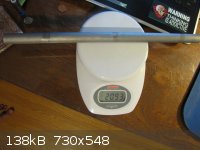 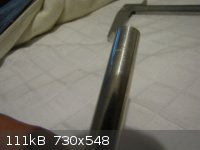 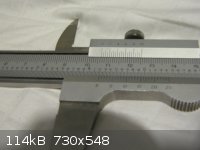 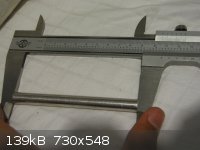 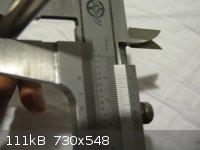 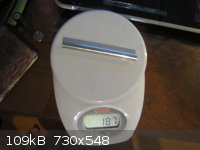
[Edited on 25-6-2012 by Erbium_Iodine_Carbon]
|
|
|
Sedit
International Hazard
    
Posts: 1939
Registered: 23-11-2008
Member Is Offline
Mood: Manic Expressive
|
|
Sorry if this has been asked but have you done a specific gravity test on it yet?
Knowledge is useless to useless people...
"I see a lot of patterns in our behavior as a nation that parallel a lot of other historical processes. The fall of Rome, the fall of Germany — the
fall of the ruling country, the people who think they can do whatever they want without anybody else's consent. I've seen this story
before."~Maynard James Keenan
|
|
|
Organicus
Harmless

Posts: 15
Registered: 29-5-2012
Member Is Offline
Mood: No Mood
|
|
Quote: Originally posted by Erbium_Iodine_Carbon  | | I could scratch the rod with a kitchen knife. I also took some pictures with the measurements. I did weigh it on a scale accurate to 0.01g and got a
mass of 185.61g. |
So whats the density now?
|
|
|
Erbium_Iodine_Carbon
Harmless

Posts: 41
Registered: 6-8-2011
Location: ON, Canada
Member Is Offline
Mood: No Mood
|
|
Density was 21.33g/cm3
V=h*pi*r^2
V=10.65*3.14159...*0.51^2
V=8.70cm3
Density=mass/volume
D=185.65/8.70
D=21.33g/cm3
[Edited on 25-6-2012 by Erbium_Iodine_Carbon]
|
|
|
blogfast25
International Hazard
    
Posts: 10562
Registered: 3-2-2008
Location: Neverland
Member Is Offline
Mood: No Mood
|
|
On photo 5 the rod seems slightly scratched, which would indicate the metal to be 'softish'. And you're certain that the rod isn't tapered, right?
With the suspicion being indeed in the direction of Pt you should really consult a jeweler, preferably one with a Niton XRF. Or take off a small piece
and have it XRFed by Fleaker...
|
|
|
hyfalcon
International Hazard
    
Posts: 1003
Registered: 29-3-2012
Member Is Offline
Mood: No Mood
|
|
Close enough for Platinum allowing for measurement error. Man, I would LOVE to have THAT for a perchlorate electrode!
|
|
|
Erbium_Iodine_Carbon
Harmless

Posts: 41
Registered: 6-8-2011
Location: ON, Canada
Member Is Offline
Mood: No Mood
|
|
The 5th pic was indeed meant to show where I scratched the rod. I wouldn't use it as a perchlorate electrode by itself because it's surface area is
tiny compared with the actual amount of platinum. I'm toying with the idea of dissolving some in aqua regia and plating it onto some other substrate,
of course if it does turn out to be Pt.
|
|
|
blogfast25
International Hazard
    
Posts: 10562
Registered: 3-2-2008
Location: Neverland
Member Is Offline
Mood: No Mood
|
|
Sure. Add saturated NH4Cl to the solution (assuming you get one) to get yellow (NH4)2PtCl6. Boy, you are one lucky %^$%&%$&(^ if this turns
out to be a majority Pt alloy!
|
|
|
plante1999
International Hazard
    
Posts: 1936
Registered: 27-12-2010
Member Is Offline
Mood: Mad as a hatter
|
|
Quote: Originally posted by blogfast25  |
Sure. Add saturated NH4Cl to the solution (assuming you get one) to get yellow (NH4)2PtCl6. Boy, you are one lucky %^$%&%$&(^ if this turns
out to be a majority Pt alloy! |
I already said this one in this thread. but test for other PGM could be
done.
I never asked for this.
|
|
|
Fleaker
International Hazard
    
Posts: 1252
Registered: 19-6-2005
Member Is Offline
Mood: nucleophilic
|
|
Neat. It's platinum then, or an alloy thereof.
FYI, don't ever use a mixture of ammonium nitrate and HCl to try and dissolve platinum--it does not work.
Neither flask nor beaker.
"Kid, you don't even know just what you don't know. "
--The Dark Lord Sauron
|
|
|
Swede
Hazard to Others
  
Posts: 491
Registered: 4-9-2008
Member Is Offline
Mood: No Mood
|
|
Interestingly, 187 grams equals 6.012 troy ounces... pretty close to a round number of troy ounces.
At $1440 / oz $US, IF the bar is Pt, then it has a value of approximately $8,640.
I see no reason for it to NOT be Pt, at least in terms of its shape. A solid bar rules out nothing. Big research firms start with all sorts of
shapes to turn out finished products. The bar may be the starting shape of any number of Pt objects/devices. And a huge firm, or a government
entity, might conceivably have dozens of these stashed away, years ago. The $$ would be piddling to them, and the temptation to lift one would be
huge.
Cool find, it'll be interesting to find out what it is.
|
|
|
unionised
International Hazard
    
Posts: 5129
Registered: 1-11-2003
Location: UK
Member Is Offline
Mood: No Mood
|
|
Humour me.
Take a long thin bottle of water, deep enough to put the rod in.
Put it on the scales and zero them. Tie a thread round the rod and lower it into the water so it is covered but not touching the bottom.
See what the scales read.
The water will exert an up thrust on the metal equal to the weight of water displaced (i.e. the volume of the rod). Since something has to provide
that force, there's a downward force on the scales.
Since the density of water is practically 1 g/ml, the weight registered on the scales is the volume of the bar.
Even if this gives you exactly the same value as the measurements with the calliper gauge it will be useful confirmation (always a good thing in
science) and it also lets me explain the easy way to measure the volume of an irregular solid.
|
|
|
smaerd
International Hazard
    
Posts: 1262
Registered: 23-1-2010
Member Is Offline
Mood: hmm...
|
|
Really cool idea unionised. I'll need to take note of this.
Who knows maybe the guy was raised in the great depression and instead of hiding his cash under the mattress due to a mistrust in banks he decided to
invest in a superfluous platinum rotor. Another interesting idea to take note of.
|
|
|
condennnsa
Hazard to Others
  
Posts: 217
Registered: 20-4-2010
Location: Romania
Member Is Offline
Mood: No Mood
|
|
Yeah, that's really cool unionised, I didn't know that!
|
|
|
Panache
International Hazard
    
Posts: 1290
Registered: 18-10-2007
Member Is Offline
Mood: Instead of being my deliverance, she had a resemblance to a Kat named Frankenstein
|
|
Platinum will carry a magnetic field, albeit more weakly than fe or ni, if you have a rare earth or strong magnet leave it attached overnight and see
if it magnetises it slightly by morning. I believe this separates the other Pgm possibilities.
|
|
|
DerAlte
National Hazard
   
Posts: 779
Registered: 14-5-2007
Location: Erehwon
Member Is Offline
Mood: Disgusted
|
|
@Panache – AFAIK, Pt is paramagnetic in bulk so your test will not work. However, in alloys it is indeed ferromagnetic in combination, eg, with
cobalt. Also, apparently in nanoparticles:
http://www.phantomsnet.net/files/abstracts/TNT2005/TNT05_Fer...
Also see www.platinummetalsreview.com/pdf/pmr-v8-i1-009-011.pdf
The presence of even small amounts of the ferromagnetic metals may thus show ferromagnetic properties.
@unionised: you wrote
| Quote: | Yes, I have.
It was the electrode from a high power flash lamp.
Do you realise that your ignorance doesn't stop other people finding a use for it?
Incidentally, I also have a tin with 5Kg of tungsten sponge in it. It was chucked out as scrap so I git it for free. Not as valuable as a single rod,
but quite a nice find.
Also, I rather suspect that they start with lengths of rod to make these.
http://www.google.co.uk/search?q=tungsten+darts&hl=en&am... |
Both your electrode and the darts are probably alloys, not pure tungsten. It does not take much alloying metal to quickly reduce the density of W. I
was referring to pure tungsten.
And yes, I do realise that my ignorance doesn't stop other people finding a use for things. Otherwise the world would have come to a stop long ago!
Your Archimedean idea is a good one. As a further demo of the principle I would add suspending the thread via a spring balance to show the effect of
buoyancy, also showing where the apparent weight gain is compensated. Your idea is far more accurate than measuring the displaced volume of the liquid
which I have often used.
The principle is very easily shown mathematically.
@ Erbium_Iodine_Carbon
I am still very skeptical (~4σ but congratulate you either way. This is either
one of the best hoaxes ever perpetrated on the members of this forum or a really lucky find. You win both ways! but congratulate you either way. This is either
one of the best hoaxes ever perpetrated on the members of this forum or a really lucky find. You win both ways!
Der Alte
|
|
|
| Pages:
1
2
3
4 |